Slack security
Updated: July 31, 2023
Slack takes security seriously and employs multiple measures to protect user data and communications. The platform implements end-to-end encryption for data transmission, ensuring that messages and files sent within Slack channels are secured during transit. Additionally, Slack complies with industry-standard security certifications and regularly undergoes third-party security audits to maintain a robust security posture. To safeguard user accounts, Slack offers multi-factor authentication, allowing users to add an extra layer of protection to their accounts. The platform also employs various security controls, like enterprise-grade access controls and permissions, to ensure that sensitive information is accessed only by authorized individuals. With continuous monitoring and quick response to security incidents, Slack is committed to maintaining a safe and secure environment for its users, making it a reliable communication and collaboration platform for businesses and organizations worldwide.
See also: Top 10 Antivirus Software
See also: Top 10 Antivirus Software
2018. Slack’s Enterprise version added security enhancements
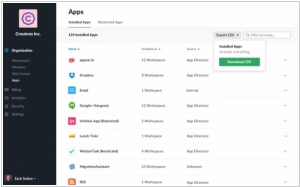
Slack has introduced a range of new security and compliance features designed to enhance the appeal of its Enterprise Grid product to IT leaders and administrators. Introduced a year ago, Enterprise Grid enables centralized management of the team chat application across an entire organization and supports up to 500,000 users. One notable addition is the new Apps page within the Slack Admin Dashboard. This feature enhances visibility and control over app usage and management across all workspaces within the organization. It offers valuable insights into app installations, channel usage, and the individuals responsible for app installations.
2017. Slack raised $250 million at $5 billion valuation
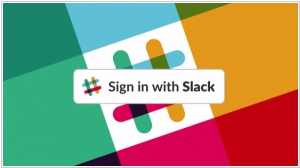
Enterprise messaging service Slack is currently in the process of raising a $250 million funding round, which would value the company at $5 billion. Slack has gained a dedicated following, particularly in Silicon Valley, but its long-term success depends on its ability to persuade large enterprises worldwide to adopt its services. While Slack positions itself as an alternative to email, it primarily serves as an internal communication platform within a company, rather than for external communication. One of the key reasons why many individuals prefer Slack over other alternatives is its contemporary interface, which resonates well with users seeking a modern communication experience.
2017. Slack launched Enterprise version of its group chat
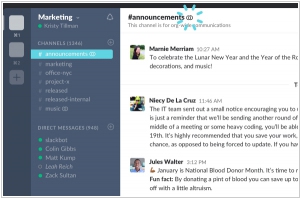
Slack has introduced Enterprise Grid, a new product specifically tailored for large enterprises. This comprehensive solution incorporates a wide range of features that are considered essential in the enterprise software market. IT administrators now have the capability to manage and provision multiple sizable teams. In addition to Slack's existing encryption measures, Enterprise Grid offers enhanced layers of security and identity management, empowering organizations to establish stricter security and compliance controls. Furthermore, it integrates with HIPAA and FINRA compliance standards and data loss prevention measures. Notable initial customers of Enterprise Grid include Capital One, Paypal, and IBM. IBM's presence is particularly noteworthy, as the company not only offers its own collaboration product, IBM Connections, for large enterprises but is also developing an AI-driven business intelligence solution called Watson Workspace. Other potential competitors in this space include Workplace by Facebook, Microsoft's Teams, Jive, and Cisco's Spark. Unlike regular Slack pricing, which starts at $8 and $15 per month for different tiers, pricing for Enterprise Grid may vary.
2016. Slack launched
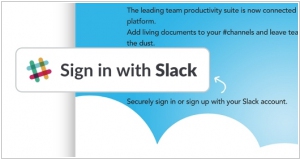
Slack has introduced a new feature called "Sign in with Slack," enabling users to sign into and utilize other applications using their Slack credentials. This places Slack in direct competition with Facebook and Google, who also operate in this market. The introduction of "Sign in with Slack" has the potential to establish Slack as the primary identity provider for enterprises. Instead of having to remember unique login information for each workplace application, users can simply utilize their Slack login. This strategic move capitalizes on the widespread need for chat communication within companies. While other workplace applications may be limited to specific departments, messaging serves as the crucial element that connects an entire business. Notable launch partners supporting Slack's identity feature include Quip (a cloud-based word processing and collaboration app), Figma, Kifi, Officevibe, Smooz, and Slackline.
2015. Slack launches a new plan for larger companies
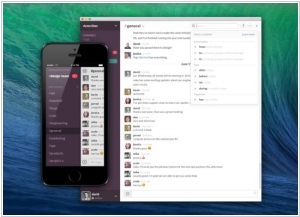
Collaboration chat app Slack has introduced several new features tailored for teams in need of assistance with single sign-on, compliance exports, a 99.99 percent uptime guarantee, and 24/7 premium support. This offering, known as the Plus plan, is a fresh option available at a price of $12.50 per user per month. According to officials from Slack, the Plus plan is designed to cater to companies with specific requirements for team management, security, and/or compliance. Typically, these organizations tend to be larger in size. Prior to this update, Slack provided two options: Lite, a free version with certain limitations, and Standard.

